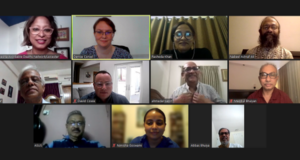July 2022 to June 2024 – Sexual and Reproductive Health Services in Remote and Hard to Reach (H2R) Areas of Bangladesh
Short title of the project: H2R
Collaborators: Dr Altaf Hussain (Principal Lead), Association for Prevention of Septic Abortion, Bangladesh (BAPSA) and Dr Nibedita Ray-Bennett (Co-Principal Lead) University of Leicester (UoL).
Duration of the Project: 1st July 2022- 30th June 2023
Funded by: NIPORT, Government of Bangladesh under ‘Joint Venture Agreement.’
Bangladesh is exposed to natural hazards and climate risk due to its geographic location and human-induced global warming. The World Bank report on Natural Disaster Hotspots (Dilley et al., 2005) highlighted that Bangladesh is in the top 60 countries of the world that are highly prone to two or more (aka multiple) hazards (flood, cyclone, storm and drought). Despite severe physical and environmental challenges, Bangladesh is one of the few low-income countries to have met its target for Millennium Development Goal 5 by reducing the maternal mortality ratio from 322 deaths per 100, 000 live births in 1998–2001 to 176 deaths per 100,000 live births in 2013 (El Arifeen et al., 2014; Gideon et al., 2015; WHO, 2015b). Although this is a remarkable achievement, reducing maternal mortality is still a challenge, as is improving maternal health from unsafe abortions and post-abortion complications in general, and especially so during disasters in hard-to-reach (H2R) areas (Ahmed et al., 2011; Huda et al., 2013; Ray-Bennett et al., 2021, 2019).
H2R areas are defined in terms of both their remote geographical location, as well as the population residing out of the range of development activities. Bangladesh has several H2R areas including char or newly emerged land-strip on the bank of rivers, haor, coastal areas, hill tracts, tea gardens – amongst others. These areas are highly prone to disasters and are populated by minority groups, in terms of religion, ethnicity (Mannanet al., 2019), as well as socio-economically vulnerable groups such as climate-induced refugees or internally displaced population – amongst others.
The overall Objective of this research project is to increase access to sexual and reproductive health (SRH) services in remote and H2R areas of Bangladesh.
Specific objectives:
- To conduct a situational analysis in hard-to-reach and disaster-prone areas (e.g., flood, cyclone, landslide)
- To review the existing drug and dietary supply (DDS) Kit, Facility Reproductive Health Kit, and Crisis Reproductive Health Kit and assess the feasibility of positioning one of these Kits in hard-to-reach and disaster-prone primary health care facilities to improve the quality and availability of SRH services including MR and PAC.
- To identify a conceptual model to provide SRH including MR and PAC services in hard-to-reach and disaster-prone areas (e.g., flood, cyclone, landslide).
- To identify the feasibility and acceptability of the proposed model(s) to ensure accessibility of SRH including MR and PAC services in PHC facilities in hard-to-reach locations from different disasters (e.g., flood, cyclone, landslide) with wider stakeholder participation.
This is an operational research based on experimental-control design and will utilise mixed methodology. The research will be conducted in two H2R districts of two divisions: Barguna district of Barisal division, and Sunamganj district of Sylhet division.
This project builds on the previous research projects titled Exploring the Challenges and Opportunities Around Reproductive Health in Disasters in Belkuchi, Bangladesh, funded by IPPF’s Innovation Fund and IPPF’s Designated Regional Fund; and Upscaling RHCC by Developing a Protocol for Low-Budget Reproductive Health Kit, funded by IPPF’s Designated Regional Fund.
Dr. Nibedita Ray-Bennett has withdrawn from the project due to funding challenges. However, ADN Future Leaders are continuing with the systematic review.
Project Updates:
23 May 2024: The article ‘Sexual and Reproductive Service Interventions for Menstrual Regulation, Safe Abortion, and Post-Abortion Care and Their Effectiveness During Disaster Response: A Global Systematic Review’ has been accepted and currently being copyedited for the Journal International Journal for Disaster Risk Science.
28 June 2023: Dr. Nibedita Ray-Bennett has submitted the systematic review report for review for the Journal International Journal for Disaster Risk Science.
16 August 2022: The research team published the article ‘A systematic review of menstrual regulation, safe abortion and post abortion care adopted and implemented in ‘natural’ disasters during response and recovery phase’. Full citation: Ekezie, W. Ray Bennett, N.S. Biswas, I. Corsel, D.M.J. Cowie, D. Nanji, A. Choudhary, N. Goswami, N. Dissanayaka, L. (2022) ‘A systematic review of menstrual regulation, safe abortion and post abortion care adopted and implemented in ‘natural’ disasters during response and recovery phase’, PROSPERO 2022 CRD42022353014, National Institute for Health Research. Available at: https://www.crd.york.ac.uk/prospero/display_record.php?ID=CRD42022353014
 24 July 2022: The research team of BAPSA and Leicester and two internal Advisors met to discuss the details of the project, roles and responsibilities of each partner and the modus operandi of this project.
24 July 2022: The research team of BAPSA and Leicester and two internal Advisors met to discuss the details of the project, roles and responsibilities of each partner and the modus operandi of this project.
